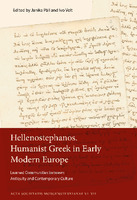Hellenostephanos. Humanist Greek in Early Modern Europe
Learned Communities between Antiquity and Contemporary Culture
Contributor(s)
Päll, Janika (editor)
Volt, Ivo (editor)
Language
English; German; FrenchAbstract
The rebirth of Ancient Greek in Europe was promoted by Humanist education and ideas to such an extent that we can consider the Greek language as a formative element of Humanist culture. Next to Latin, the default common language, a Humanist has to know and use Greek, because he is not, cannot and will not be a barbarian: barbaros ou pelomai, as Julius Caesar Scaliger claimed in his verses in 1600. Wreaths (stephanoi) have been the symbols of the cult of Muses from ancient times. After the love for Greek Muses had been revived by Renaissance Humanist poets and scholars, it has remained with us both in poetic activity and in scholarship. The Hellenostephanos volume presents a collection of papers by scholars who study Humanist Greek, aspiring towards another revival of Hellenism, and trying to avoid being barbarians. The volume includes papers by Christian Gastgeber, Gita Bērziņa, Janika Päll, Charalampos Minaoglou, Erkki Sironen, Kaspar Kolk, Tua Korhonen, Johanna Akujärvi, Bartosz Awianowicz, Jean-Marie Flamand, Walther Ludwig, Alessandra Lukinovich, Martin Steinrück, Tomas Veteikis, Grigory Vorobyev, Vlado Rezar, Pieta van Beek, and Antoine Haaker.
Keywords
Humanism; Humanist education; Humanist culture; Humanist Greek; Ancient Greek; Hellenism; Greeks; Renaissance humanismISBN
9789949778232OCN
1051780905Publisher
University of Tartu PressPublication date and place
Tartu, 2018Series
Acta Societatis Morgensternianae, 6–7Classification
Hellenic languages
Ancient, classical and medieval texts
Literary studies: ancient, classical and medieval
Literary studies: general
History and Archaeology
c 1500 onwards to present day
Social and cultural history


 Download
Download Web Shop
Web Shop